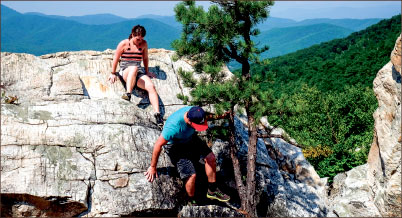Autumn adventures

Students explore outside and learn to follow safety signs
Fall leaves.
Fresh air.
Fun times.
Autumn is quickly approaching, and for many Liberty University students, this is prime time for outdoor activities such as hiking and camping.

Climb — Students enjoyed hiking in the outdoors after returning to campus this fall. Photo credit: Leah Seavers
But before students plan weekend excursions hiking through the woods, they should make sure they prepare for whatever comes their way.
When planning to participate in outdoor activities, students should consider the “4Es” of decision-making.
According to Student Activities (SA) Director of Outdoor Recreation Joshua Yeoman, the four Es are Environment, Element, Experience and Equipment.
Students should consider and plan for the environmental conditions they will face. Yeoman encourages students to ask questions such as “What is the topography? What is the temperature? Will there be any rain, snow or ice? What are my water resources? What types of animals or reptiles might I encounter?”
Next, students should consider the element or activity they will be participating in, such as running, hiking, mountain biking, paddling or camping. According to Yeoman, it is important to consider how the environment and the student’s experience level might affect their safety.
Based on these considerations, Yeoman said it is important to pack outdoor essentials such as water, food, a rain jacket or poncho, a first-aid kit and a map.
Yeoman also recommends students bring a cell phone or other means of communication.
“Many people go to wilderness places to get away from technology, but taking a cell phone with you could really be helpful in an emergency,” Yeoman said. “Obviously if you get hurt you need to call 911 or have someone run to the nearest phone and call 911.”
According to Yeoman, students should inform someone of their plans, including destination, route and planned completion time.
Students may also face the potential threat of wildlife when participating in outdoor activities.
Yeoman said a good rule of thumb is to leave animals alone as bears, coyotes and snakes live in the woods in Virginia.
Many recommendations on how to handle a snake bite have circulated over the years, but Yeoman said that the best thing to do when dealing with a snake bite is to keep the individual calm and seek medical attention as soon as possible.
“You do not want to elevate the victim’s heart rate rapidly,” Yeoman said.
Other “do nots,” according to Yeoman, include: do not try to suck the venom out, do not tie a tourniquet and do not apply compression to the bite.
“These actions could localize the venom, creating a very negative effect including, but not limited to, losing a limb,” Yeoman said.
In collaboration with Camp Hydaway, SA Outdoor Recreation staff holds trail running and mountain biking seminars in order to give students the opportunity to get the training they need in outdoor safety.
With Emergency Medical Technician, Wilderness First Responders and Swiftwater Rescue Technician certifications, the SA Outdoor Recreation staff are well equipped in training students to be safe and get the most out of their time in the outdoors, Yeoman said.
For more information on SA Outdoor Recreation, visit www.liberty.edu/campusrec.
FYI
Students should always be sure to notify someone of where they are going, their planned activities, and what time they plan on returning.
BUNNER is a news reporter.
